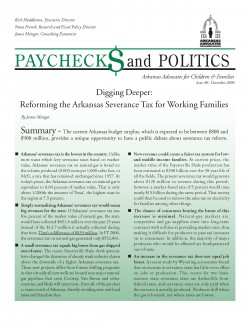
The current Arkansas budget surplus, which is expected to be between $800 and
$900 million, provides a unique opportunity to have a public debate about severance tax reform.
- Arkansas’ severance tax is the lowest in the country. Unlike most states which levy severance taxes based on market value, Arkansas’ severance tax on natural gas is levied on the volume produced (0.003 cents per 1,000 cubic feet, or Mcf ), a rate that has remained unchanged since 1957. At today’s prices, the Arkansas severance tax on natural gas is equivalent to 0.04 percent of market value. That is only about 1/200th the amount of Texas’, the highest state in the region at 7.5 percent.
- Simply normalizing Arkansas’ severance tax would mean big revenues for the state. If Arkansas’ severance tax was five percent of the market value of natural gas, the state would have collected $851.8 million over the past 25 years instead of the $12.7 million it actually collected during that time. That’s a difference of $839 million . In FY 2006, the severance tax on natural gas generated only $552,861.
- A small severance tax equals big losses from gas shipped out-of-state. The recent Fayetteville Shale developments have changed the dynamics of already weak industry claims about the downside of a higher Arkansas severance tax. These new projects differ from former drilling programs in that virtually all new wells are located near major natural-gas pipelines that cross Conway, Van Buren and other counties, and likely will carry most, if not all, of the product to states north of Arkansas, thereby avoiding state and local taxes and franchise fees.
- New revenue could create a fairer tax system for low- and middle-income families. At current prices, the market value of the Fayetteville Shale production has been estimated at $300 billion over the 30-year life of all the fields. The present severance tax would generate about $120 million in revenue during this period; however, a market-based rate of 5 percent would raise nearly $15 billion during the same period. That money could then be used to remove the sales tax on electricity for families among other things.
- The chance of consumers bearing the brunt of this increase is minimal. Natural-gas markets are competitive and gas suppliers enter into long-term contracts with utilities at prevailing market rates, thus making it difficult for producers to pass tax increases on to consumers. In addition, the majority of major producers who would be affected are headquartered out-of-state.
- An increase in the severance tax does not equal job losses. A recent study by Wyoming economists found that an increase in severance taxes has little or no effect on jobs or production. This occurs for two basic reasons: state severance taxes are deductible from federal taxes, and severance taxes are only paid when the resource is actually produced. Producers drill where the gas is located, not where taxes are lowest.
